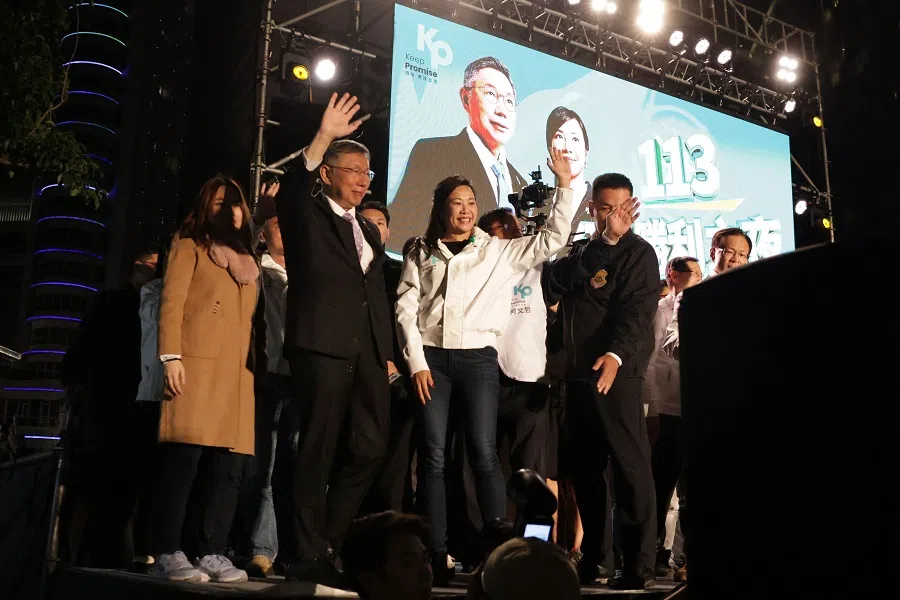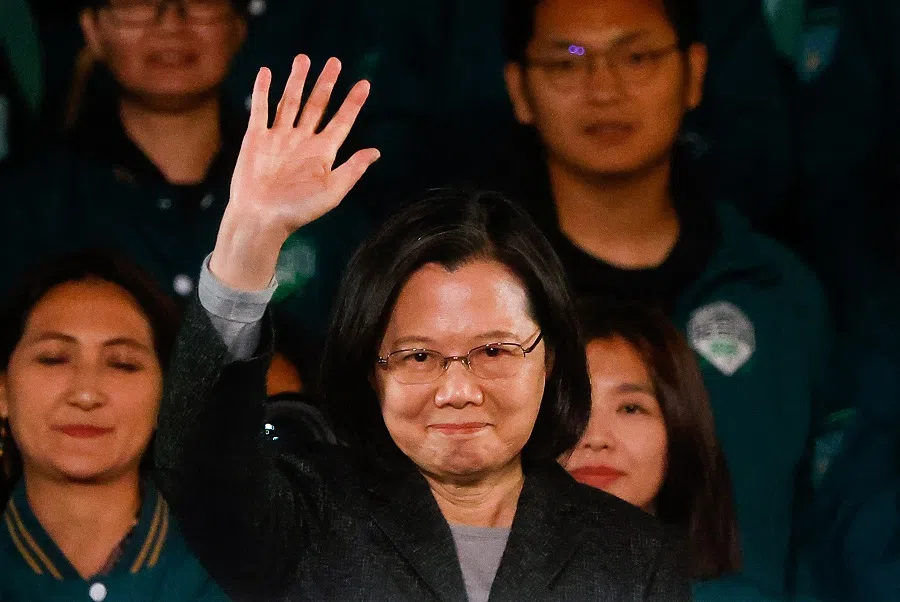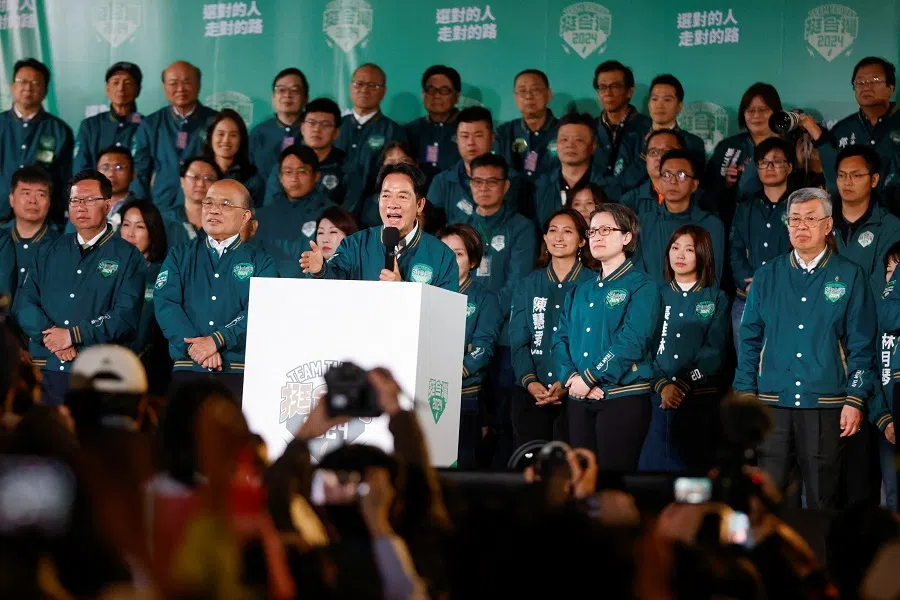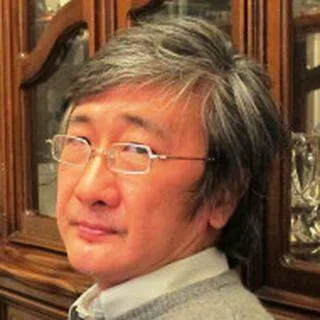William Lai's biggest challenge will be Xi Jinping and Ko Wen-je
With the Taiwan presidential elections at a close and the Democratic Progressive Party clinching a historic third consecutive term, commentator Gu Erde takes a look at the challenges ahead for president-elect William Lai.

The year 2024 is dubbed the "global election year" with over half the world's population - about 4.2 billion people - set to go to the polls, making it a historic election year.
DPP's victory over KMT and TPP
The first major election that took place was the Taiwan presidential election on 13 January. This election received global attention because Taiwan stands at the forefront of the global competition between the US and China. In the end, William Lai, presidential candidate of the ruling Democratic Progressive Party (DPP), won the race with 5.58 million votes, or about 40% of the vote share. This means that the DPP, which stresses the sovereignty and independence of the Republic of China (Taiwan), has earned a third presidential term.
This is also a declaration that the majority of the Taiwanese do not wish to reunify with the mainland, making "reunification of the motherland", which mainland Chinese President Xi Jinping has declared a "historical inevitability", even more challenging.
... for the first time since Taiwan introduced its direct presidential elections in the 1990s, the same political party will be in power for three consecutive terms.
After the outcome of the presidential elections was released, Singapore's Ministry of Foreign Affairs congratulated Lai and the DPP, stressing that Singapore will "continue to grow this relationship based on our 'One China' policy", and that "dialogue, building trust, and pursuing cooperation will be beneficial for both sides of the strait". Indeed, cross-strait issues will be one of Lai's three major challenges for the next four years.
Although the Lai and Hsiao Bi-khim pairing earned far less votes than the previous Tsai Ing-wen and Lai pairing (a historic record of 8.17 million votes, or 57.1% of the vote share), the Lai-Hsiao ticket made another record: for the first time since Taiwan introduced its direct presidential elections in the 1990s, the same political party will be in power for three consecutive terms.

It is uncommon for the ruling party of a democracy to win three consecutive elections. In the case of the US, only Ronald Reagan and George H. W. Bush managed to keep the Republicans in power for three consecutive terms so far since the Second World War. On the one hand, the normalised network of power and benefit distribution is prone to corruption and discontent among those who have not been able to dip into the benefits. On the other hand, the picky people, who have become "masters of the country", are also prone to abandon the old for the new, no matter how good the incumbent government might be.
During the recently concluded elections, the DPP's corruption and moral scandals of some of its elites were highlighted by its opponent. Meanwhile, the ineffectiveness of the housing policy in curbing high housing prices ("housing justice" issues) was heavily criticised and had in particular triggered dissatisfaction among younger voters.
Although Lai was not embroiled in moral scandals, the "housing justice" issues led to controversy over whether his old family house was illegally expanded. But the tables were later turned when his rival Hou Yu-ih's family, who owns several properties, had leased apartments to students at a high price; and when another presidential candidate Ko Wen-je was suspected of illegally leasing a plot of land zoned for farming. As a result, the Lai camp was able to turn defence into offence and stage a counterattack.
... a large portion of the TPP's supporters are younger voters who are not only dissatisfied with the ruling DPP but also detest the old-fashioned KMT.
Blue and White camps also aligned with 'Tsai Ing-wen path'
As for the split in the opposition camp, was the failure of the Blue-White coalition also an important factor that helped Lai win the election? This is in fact debatable.
Indeed, based on simple maths, the votes of the blue Kuomintang (KMT) and the white Taiwan People's Party (TPP) added together will certainly outnumber the green DPP. However, a large portion of the TPP's supporters are younger voters who are not only dissatisfied with the ruling DPP but also detest the old-fashioned KMT.

If the Blue-White coalition had materialised and Ko became the vice-presidential candidate, a huge number of votes from younger voters might have been lost and their victory would have been uncertain. It is exactly because of this concern that TPP cadres had stopped Ko from agreeing to a Blue-White coalition.
In the end, what really affected the outcome of the elections was how Taiwan chose to respond to the mainland. Simply put, amid China-US competition, does Taiwan want to be pro-China or pro-US? Does Taiwan want to stand on the side of democracy or compromise with the mainland?
Over the past eight years, Tsai was neither overbearing nor self-effacing when faced with Beijing's criticisms and military intimidation. This stance won her a re-election four years ago.
During the 2024 presidential elections, Lai's slogan is "walk the right path, choose the right person" (走对的路,选对的人). The "right path" refers to the "Tsai Ing-wen path". In the final stages of election campaigns, Tsai showed her support for Lai and told voters, "There is no time for Taiwan to walk the wrong path, much less go backwards."
Even if both the Blue and White camps have criticised the DPP for not communicating with Beijing, they are actually increasingly aligned with Tsai's path.

In the last leg of campaigning, even Ko claimed he would walk the "Tsai Ing-wen path". When former Taiwan President Ma Ying-jeou accepted an interview with Deutsche Welle nearing the elections, and stressed his trust in mainland Chinese leader Xi Jinping and opposed enhancing Taiwan's defence capabilities, Hou immediately distanced himself from Ma for fear of affecting the election.
Even if both the Blue and White camps have criticised the DPP for not communicating with Beijing, they are actually increasingly aligned with Tsai's path.
Beijing's response will wait
Lai had called himself a "pragmatic worker for Taiwan independence" in the past, and this not only irked Beijing but also left Washington doubtful.
However, since the start of campaigning, Lai has equated his "pragmatic road to Taiwan independence" with "maintaining the status quo", and emphasised that he would continue on the path set by Tsai, i.e., to adhere to the "four commitments" she had put forth in her speech during the Double Tenth Day in 2021: commitment to a free and democratic constitutional system, commitment that the Republic of China (ROC) and the People's Republic of China should not be subordinate to each other, commitment to resist annexation or encroachment upon ROC sovereignty, and commitment that the future of the ROC (Taiwan) must be decided in accordance with the will of the Taiwanese people.
On the night of his electoral victory, Lai stated that his victory "means that Taiwan will continue on the right path. We will not change paths, nor will we go backwards." He added that Tsai "left us with a better Taiwan," while also proclaiming that "in the future, Taiwan will continue to walk alongside its international democratic allies".
Looking at Beijing's attitude towards Tsai in the past eight years, it can be expected that in the short run, Beijing would not publicly express any goodwill towards Lai. But it can also be expected that from the period between now and when Lai officially assumes office, both sides will attempt to build communication channels, and there will also be brave folks who will try their best to bridge the two sides of the strait.
Will there be greater tension or more amicable relations between Beijing and Lai? This will depend on the specific policies and events that follow, as well as how both sides handle matters.
Whether the DPP can succeed will depend on whether it can make use of its administrative resources to work with the TPP in an exchange of interests, or even directly poach TPP or KMT legislators.

One other point is certain: the US will be holding its own elections towards the end of 2024, and China will first observe the political changes in Washington before deciding how to deal with its opponent Lai.
Challenges in Legislative Yuan
Lai's immediate challenge in terms of domestic politics would be to address the DPP's failure to secure a majority in the Legislative Yuan, capturing only 51 out of the 113 seats - which is one seat less than the KMT. The TPP secured eight seats and has become a key minority, with the remaining two independent seats going to KMT-friendly legislators.
Without a majority, Lai would have a tough time pushing policies in the future. Assuming that the KMT legislators vote in unison and the two independent legislators vote along KMT lines, the DPP would need to win over at least six votes from TPP legislators to secure a majority in the Legislative Yuan (57 seats). The DPP would still need to win at least four votes to surpass the KMT (52 seats, along with two independent seats). Both would be quite a challenge.
Whether the DPP can succeed will depend on whether it can make use of its administrative resources to work with the TPP in an exchange of interests, or even directly poach TPP or KMT legislators.
The election results proved that the rejection of a Blue-White coalition by Ko's campaign manager, Huang Shan-shan (who tops the list of the TPP's legislators-at-large), among others, was the right strategic choice. The TPP captured 22% of the party votes and will be the third largest party in the Legislative Yuan. It can now benefit from both sides, choosing either to work with the KMT or strike a deal with the DPP.
In the coming four years, Ko will continue to be a key figure in Taiwan's political scene.

How this will turn out depends on whether Ko's leadership ability (which was previously heavily criticised) will improve, and whether he can unite the eight TPP legislators to be on the same page.
Ko the man to watch
Ko and the TPP will not only have influence in the Legislative Yuan, but more importantly, Ko had captured 26% of the votes in the presidential elections, which points towards strong solidarity among his supporters. Even though the Blue-White coalition fell through, the votes were not lost to the Blue or Green camps.
During a campaign event on the night before the elections, the participants at Ko's event outnumbered those at the KMT and DPP events. What was even more crucial was that Ko attracted a large group of young voters, and his event had a more youthful vibrancy than the events for the Blue and Green camps. Young voters have long been a key factor in the Green camp's electoral victories.
In the coming four years, Ko will continue to be a key figure in Taiwan's political scene. He has a stable base of supporters and will receive a sizeable amount of government funding following the elections. Flushed with funds and talent, the TPP has great room for growth. On cross-strait relations, Beijing trusts the KMT more than Ko, but Ko is far more receptive to working with Beijing than the DPP, and in the future, Beijing will strengthen united front efforts with the TPP.
As for the defeated Hou, he will most likely return to serve out his term as the mayor of New Taipei City before slowly fading out of the political core. The right-wing faction of the KMT led by vice-presidential candidate Jaw Shaw-kong, the "Blue fighters", saw their seats at the Legislative Yuan increased to 21 seats, and will continue to be an influential factor in the future.
However, on the whole, in contrast with the TPP's rise, it's hard to undo the downward spiral of the KMT. As for Lai, he will have to work hard to regain the hearts and minds of the young to create the miracle of four consecutive terms in office for the DPP.
This article was first published in Lianhe Zaobao as "赖清德未来最大挑战:习近平与柯文哲".



![[Big read] When the Arctic opens, what happens to Singapore?](https://cassette.sphdigital.com.sg/image/thinkchina/da65edebca34645c711c55e83e9877109b3c53847ebb1305573974651df1d13a)
![[Video] George Yeo: America’s deep pain — and why China won’t colonise](https://cassette.sphdigital.com.sg/image/thinkchina/15083e45d96c12390bdea6af2daf19fd9fcd875aa44a0f92796f34e3dad561cc)
